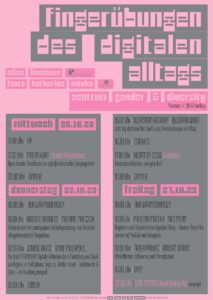
Welcome to the Website of the Working Unit Everyday Media and Digital Cultures at Johannes Gutenberg University Mainz!
In the working unit Everyday Media and Digital Cultures we investigate media from the perspective of their everyday usage and examine them in the context of digitalization. Digital everyday media include social networks, web videos, video chat software, voice assistants, and wearables. They perform familiar and useful functions while at the same time radically transforming existing everyday cultures. For example, traditional maps and phones are evolving into Google Maps and Google Phones through convergence and datafication processes. Such transformation is associated with far-reaching technological and cultural innovations, but also with social, political, and economic frictions, which our unit analyzes, classifies, and reflects on an empirical, historical, and theoretical level.
Furthermore, we consider everyday life itself as a medium that mediates between social structures and technical infrastructures on the one hand and individual actions and apparatuses on the other. Thus, the medium of everyday life also reveals whether products such as (the failed) Google Glass or medical masks can be established on a mass scale.
Integrated into the Institute for Film, Theater, Media, and Cultural Studies (FTMK), the working unit, founded in 2021, intersects with the other disciplines at the Institute:
- In exchange with the working unit on media cultural studies, we emphasize the aspect of everyday media use.
- Complementing perspectives in cultural anthropology, we highlight the media conditions of cultural processes.
- Our research on digital images (e.g., social videos) takes place in an ongoing dialogue with theatre studies, film studies, and media dramaturgy.
The working unit Everyday Media and Digital Cultures complements existing subject-specific expertise, expands the research and teaching offerings at the FTMK Institute, and enhances cultural media studies at the Johannes Gutenberg University Mainz.
Current research foci are:
- Political videos on social media
- Media witnessing
- Critical phenomenology of networked bodies
News
